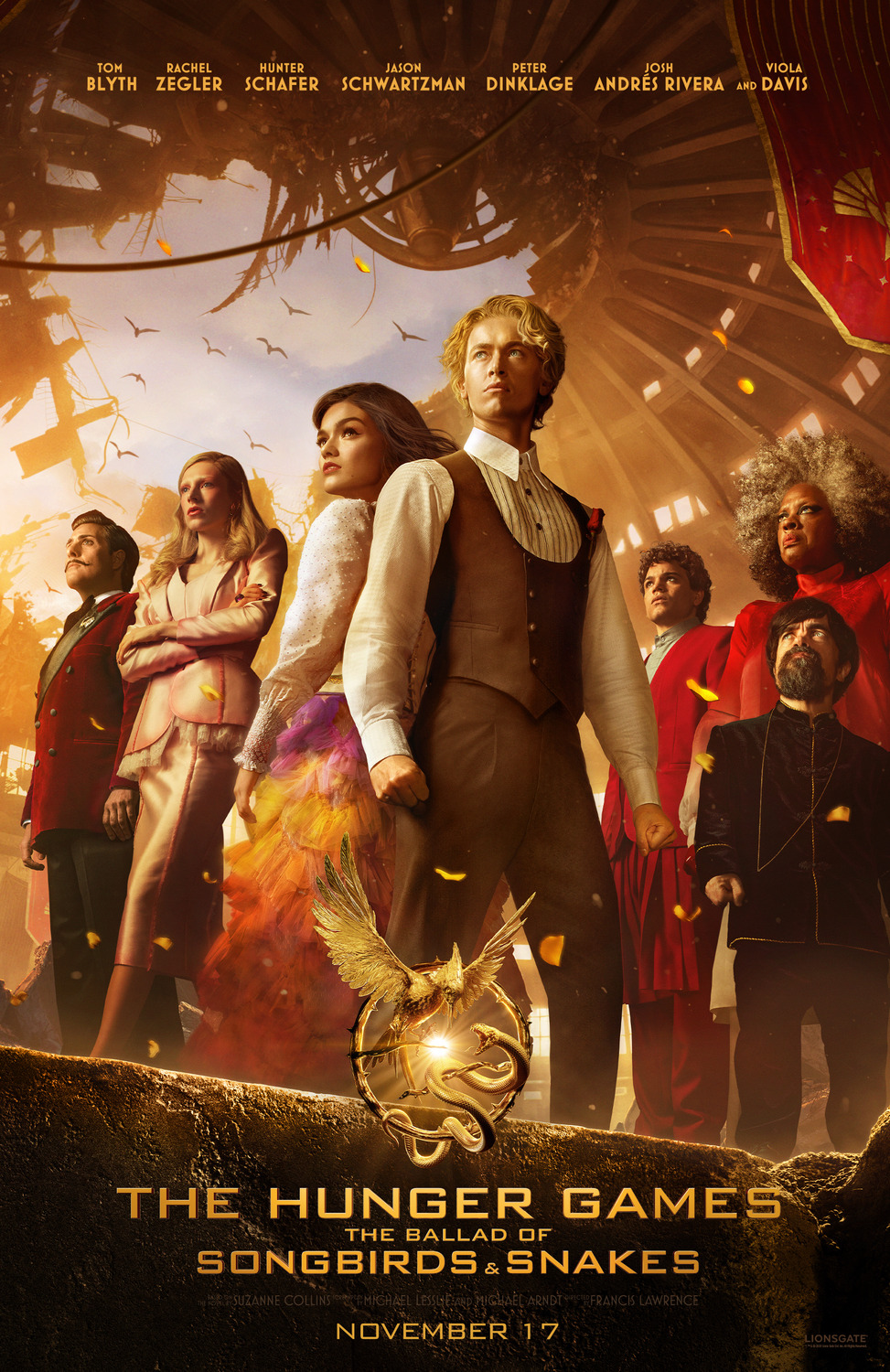Director
Francis Lawrence
Starring
Tom Blyth
Rachel Zegler
Peter Dinklage
Viola Davis
Set some sixty years before the events of The Hunger Games, The Ballad Of Songbirds & Snakes tracks the rise of future President and ruler, Coriolanus Snow. The titular games – where two children from each district in the nation are selected to fight to the death – is in its tenth year. But already viewing figures are waning. And with it, a fear that ambiguity could lead to dissent, and ultimately, war. With that in mind, it’s decided that for this anniversary reaping, the tributes will be assigned fellow teenage guardians as mentors. The aim being to make them spectacles, to market the meat before it is thrown into the grinder, as it were. However, Coriolanus Snow [Blyth] is paired with the quirky and defiant Lucy May [Zegler] and the pair begin to fall for one another, despite their dramatically different backgrounds.
You’d be forgiven for not realising, but it’s been eight years since the four Hunger Games films concluded. Despite this passage of time, the studio have picked up exactly where they left off. After all, this is based on a book by the same author, Lawrence is back to direct, and he’s brought with him Jo Willems as director of photography and James Newton Howard on the score. What isn’t back, however, is the money. The franchise netted around 3 billion dollars from a 500 million investment, spaced out over four films. The budget here, however, is less than $100 million. But why does this matter? Well, while it could be construed in various ways, the lower budget gives a very strong impression that the studio doesn’t necessarily care about this film, making it a production of obligation rather than passion.
But, thanks to its smaller, simpler scope, this feature can tell a more concentrated story. Meaning, without the need to really cover the war that birthed the Hunger Games, how said games were implemented, or even any sort of rise or fall of the system itself, we’re instead left with a sort of diabolical quasi-biopic of the ascent of reality TV. And with such an intense star-crossed lovers tale, the established fantastic dystopian world building can do the heavy lifting off-screen, allowing the focus to remain on the teenage romantic drama. This, regrettably, does not always manifest, however, as the world at large simply feels smaller and less significant. In the first two movies, the game itself was the most interesting part of the film. But, in their rudimentary form – before all the spectacle and sadistic mirth is injected – what we have here boils down to a fairly straightforward action sequence, followed by a pace-crushing lull for the entire central third of the runtime.
But let’s discuss the characters. Because if the film can’t wow us with its visuals, it has to hit us in the gut with its emotional leads. And it does. For the most part. Blyth and Zegler work extremely well together. Their chemistry is decent enough and you never really get a clean answer as to whether what they’re feeling and showing is an act, or genuine love. Which creates some wonderful back-and-forth uncertainty; after all, both have significant stakes and are evidently victims of the same monstrous system. But, this remains a villain origin story. And thus we hit “the Maleficent problem.” Sympathise, understand, and be swayed by the characters, sure, but we’re all waiting for the inevitable turn. The eventual transition from “I’m just a poor boy, nobody loves me” to “I’m going to be the face and power behind this annual murder brawl.” And to make an audience care, they have to be sold on the reasons and be swept up in the heady madness of it all. Oddly enough, something that Killers Of The Flower Moon does masterfully. What we have here however is incredibly clumsy. I can’t overly fault the leads, more the script itself, as what the film offers up feels very rushed and unsatisfying.
Outside of the leads, we have the usual host of bizarre characters that we’ve come to expect from the franchise. Yet these exist on a sliding scale. On one end you have Viola Davis as the head gamemaker, Volumina Gaul, who feels like one of the only real representations of the Panem Capitol that we’ve seen previously. Eccentric, manipulative, unpredictable – all wrapped in compelling visual flair. Then, slap bang in the middle is Jason Schwartzman, who is magnificently cast as Stanley Tucci’s archetype/precursor. Being a plucky weatherman who’s both able to spin on the fly, as well as view the brutality with complete dispassion, makes him a real insight into what is eventually expected of the show’s host. And then we have Peter Dinklage’s character, Casca Highbottom: the man responsible for the Hunger Games who is now Dean of the leading academic institute. An addict plagued by demons, Highbottom has so much hatred for Snow but it’s never given much room to breathe. And the only true exploration we’re offered is in the film’s final minutes. And by then, it feels like an afterthought.
In truth, by the time the third act comes around the film already feels like it should be at an end but marches on regardless. In fact, throughout its lengthy narrative, we’re given hints of complexity, some bombastic moments, and subtle intrigue. But it’s simply not enough. Much like The Hobbit or Fantastic Beasts, The Ballad Of Songbirds & Snakes plays well in the world but the story itself falls short of what we’ve already seen on screen. Granted, there’s a semblance of fascination and immersion but little more than a passing footnote for die-hard fans. That said, what is achieved with these relative bare bones, is perfectly serviceable. And for a lot of cinemagoers, that will be enough.
Release Date:
17 November 2023
The Scene To Look Out For:
**spoilers alluded to within this paragraph**
Given the reduced budget, we never get much of a glimpse into the Capitol nor the other districts, outside of a handful of establishing shots. Because of that, the majority of events are set in dark interior locations. That said, the film knows what it was building to and one setup in particular does exactly as intended. Specifically, I’m referring to the image of Lucy Gray, singing defiantly, covered in writhing snakes – as an emotional culmination and combination of performance and tension, it creates quite the striking moment.
Notable Characters:
The inclusion of Snow’s sister Tigris (who later goes on to be an influential part of Katniss’ story as a surgically altered cat lady) is an odd one. Hunter Schafer plays the role of Snow’s older sister well. A sort of lifeline of kindness and empathy that’s ebbed away the more Snow spends time with people like Gaul. But eventually this connection becomes more tertiary and redundant under the lumbering weight of the two and a half hour runtime. Meaning its impact is ultimately lost, and you’d be forgiven for not even realising the character featured in the other films at all.
Highlighted Quote:
“What happened in there is humanity undressed. When fuelled by fear, see how quickly prey becomes predator.”
In A Few Words:
“A perfectly functional effort that struggles to justify its own existence.”
Total Score: 2/5

![The Red Right Hand Movie Reviews [Matthew Stogdon]](https://reviews.theredrighthand.co.uk/wp-content/uploads/2021/12/cropped-header1.png)



